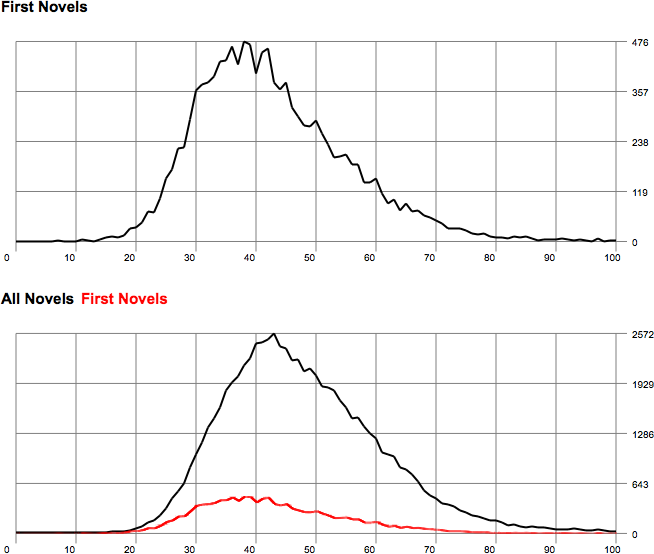Do writers need 10,000 hours of training to become successful writers?
Let us look at some evidence.
Many people write poems, stories and (parts of) novels at some point in their lives, but very few manage to get a book published. So I will, for the moment, use getting a book published as an indicator for success as a writer.
Now, here is a graphic taken from the Internet Speculative Fiction Database that shows how many books authors published at what age. (The curve of first novels is vertically exaggerated in the first graph. In the second graph the curve of first novels has been scaled to fit into the distribution of all novels.)

As you can see, the majority of first novels are being published by authors in their thirties and early fourties, and more first novels are published by authors in their fifties than in their twenties.
What does that mean? Does that mean that these authors started writing when they were 37 or 56 and then got the first piece of writing they ever wrote published rightaway the next year? Certainly not. If you read biographies of authors, or simply observe the vast number of wannabe writers in their teens and twenties, then you will realize that most of these authors who published their first book in middle age or even late in life, will have written many stories, novels, or other writings, before they found success with what in truth wasn't their "first novel" at all, but only the first novel to get published after many previous failed attempts.
Not having the exact numbers but only eyeballing the graphic, I would say that the mean of the distribution is somewhere around 40 years. That means that on average a first novel is published when its author is around 40 years old. Now, if you agree with me that this person will very likely have been writing since their late adolescence or early adulthood, they will easily have done more than 10,000 hours of writing before their first publication, that is: before they became successful.
If you want to be a writer, it makes a lot of sense to plan your writing career long term ;-)

